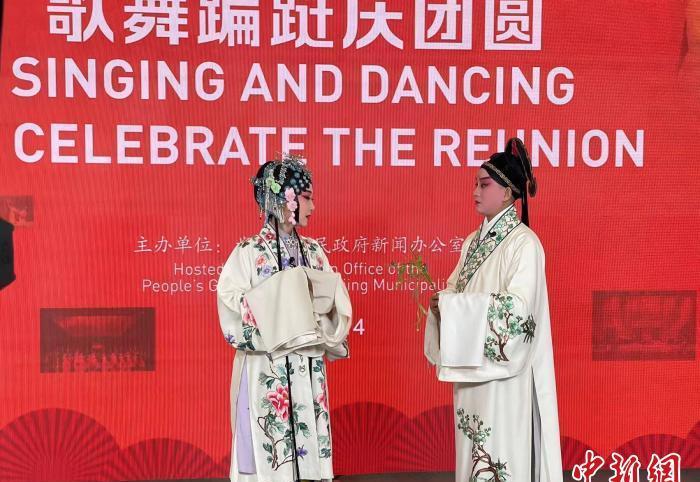
The picture shows the scene of the event, and the performance clip of the "Peony Pavilion" of the Metropolitan Edition. Photo by Liu Wenxi, a reporter from China News Service
Beijing, February 14 (Xinhua) -- Holding the hand of her son, she is dead and alive. The Chinese Lunar Lantern Festival coincides with Valentine's Day, and on February 14, 2022, the Beijing News Center held an interactive display activity with the theme of "Singing and Dancing to Celebrate reunion", in which guests told the legendary stories in the works of art, allowing the audience to seek and taste the "Chinese romance" in traditional culture.
Love is the eternal theme of literary and artistic works. From classical literature to opera works, from dance performances to dramatic singing, since ancient times, Chinese artists have written, interpreted and praised love in their own way, leaving behind romantic stories that touch people's hearts.
More than 400 years ago, the playwright Tang Xianzu wrote "Peony Pavilion". "Then for you is like a beautiful flower, like a year of water flowing", transcending the world, beyond life and death; now, the Northern Kunqu Opera Theater from Beijing has let Tang Weng's deep love reappear on the stage and once again infect the audience.
Cao Ying, vice president of the Northern Kunqu Opera Theatre, introduced that Kunqu opera is known as the "master of a hundred operas", which has a history of more than 400 years and is also the first batch of national intangible cultural heritage in China. Since the Ming Dynasty, "Peony Pavilion" has almost become synonymous with Kunqu opera. "Peony Pavilion" depicts the touching and profound life and death love between Du Liniang and Liu Mengmei, and the playwright uses bold imagination, artistic exaggeration and twists and turns of bizarre dramatic plot to create a highly idealized character image and complete the theme of love.
In order to make Kunqu opera well known to more young people in contemporary times, the Northern Kunqu Opera Theater emphasizes the concept of "youth", reinterprets the original work while restoring elegant classics, and creates a "Dadu version of "Peony Pavilion"" to activate the words into a dreamlike magnificent scene, presenting it in front of people.
From literary scripts to actor selection, from stage art to campus popularization, the metropolitan version of "Peony Pavilion" adopts a new creative method: using the "cushion field" to make people who watch Kunqu opera for the first time have a preliminary understanding of Kunqu; choosing young actors from "post-80s" and "post-90s" to star, attracting young audiences into the theater; cooperating with professors of the Central Academy of Drama to design stage art to create "flowing paintings" on the stage; moving the stage to the classroom, so that more students like and even learn Kunqu opera... When the "Education of Love" course and traditional music entered the campus hand in hand, Cao Ying said that Kunqu opera allowed more children to cultivate the ability to appreciate and comprehend beauty.
When it comes to love in classical Chinese literature, I have to mention "Dream of the Red Chamber". Liu Zhen, vice chairman of the Beijing Dancers Association, said that "Dream of the Red Chamber" often enters people's cultural life in the form of film and television, opera, etc., and the dance drama "Cao Xueqin" for the first time uses dance as an art form to express Cao Xueqin's life, revealing to the world the creative story behind this literary masterpiece.
In terms of content presentation, the dance drama "Cao Xueqin" enters his heart and mind more from his emotional experience, leading the audience to feel the romantic purity of "Dream of the Red Chamber" with Cao Xueqin.
There are many physical expressions of emotion in the dance drama "Cao Xueqin". Liu Zhen mentioned that there is a scene in the play where Cao Xueqin and her lover dance together on the stairs behind the frame. This innovative presentation makes the audience feel ethereal love, and the mirror frame is reminiscent of the "flower in the mirror" of "Dream of the Red Chamber"; in another scene, the moonlight in the sky hits the ground, and the two actors dance in the aperture, which naturally makes people have the reverie of "Moon in the Water" - Mirror Flower Water Moon, which is Cao Xueqin's inner portrayal when creating "Dream of the Red Chamber".
In various types of love works, some use a glimpse of "amazing" time, and some use nostalgia for the "gentle" years. In "Mulan Word, Quasi-Ancient Decisive Word Cambodian Friend", the author Naran Sex de used "if life is only like the first sight" to recall the thrill of love at the first sight. Liu Zhen said that Naran's attachment to feelings can be seen in the many eulogies he wrote for his deceased wife. It is also touched by this obsession that Liu Zhen created the dance drama "If Life Is Only Like the First Sight".
In this work, he extends this timeless amazement from love to friendship and home and country, interpreting people's dedication to persevering for a lifetime for love.
"'If life is only like the first sight' contains too many connotations, everyone has a different understanding and feeling about it." Liu Zhen said that at the end of the dance drama, Naran's wife Lu Shi appeared on a swing, which was the perfect love that the work "returned" to Naran's sex, and it was also the purest romantic gift brought to the audience by the creator. (End)